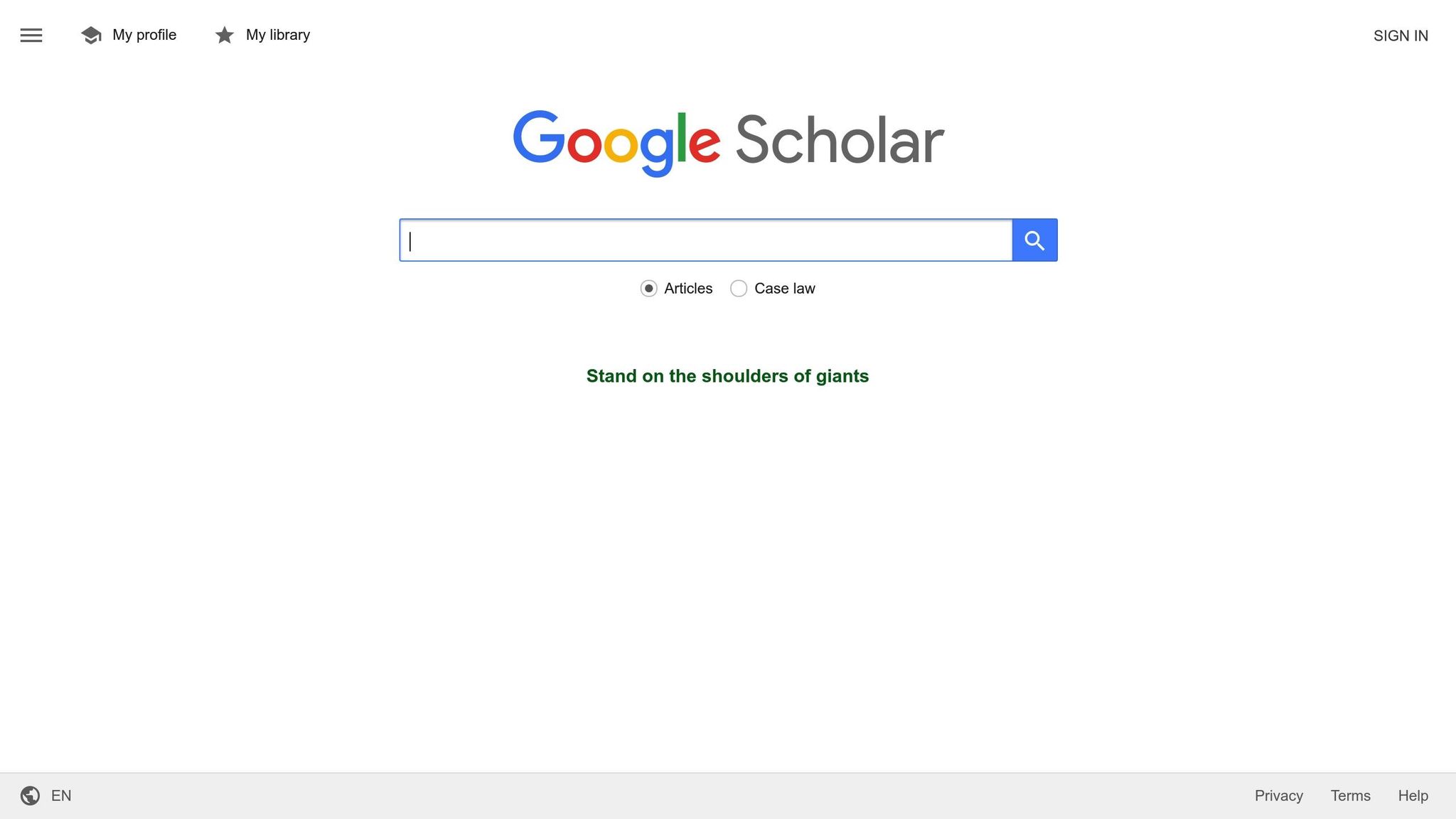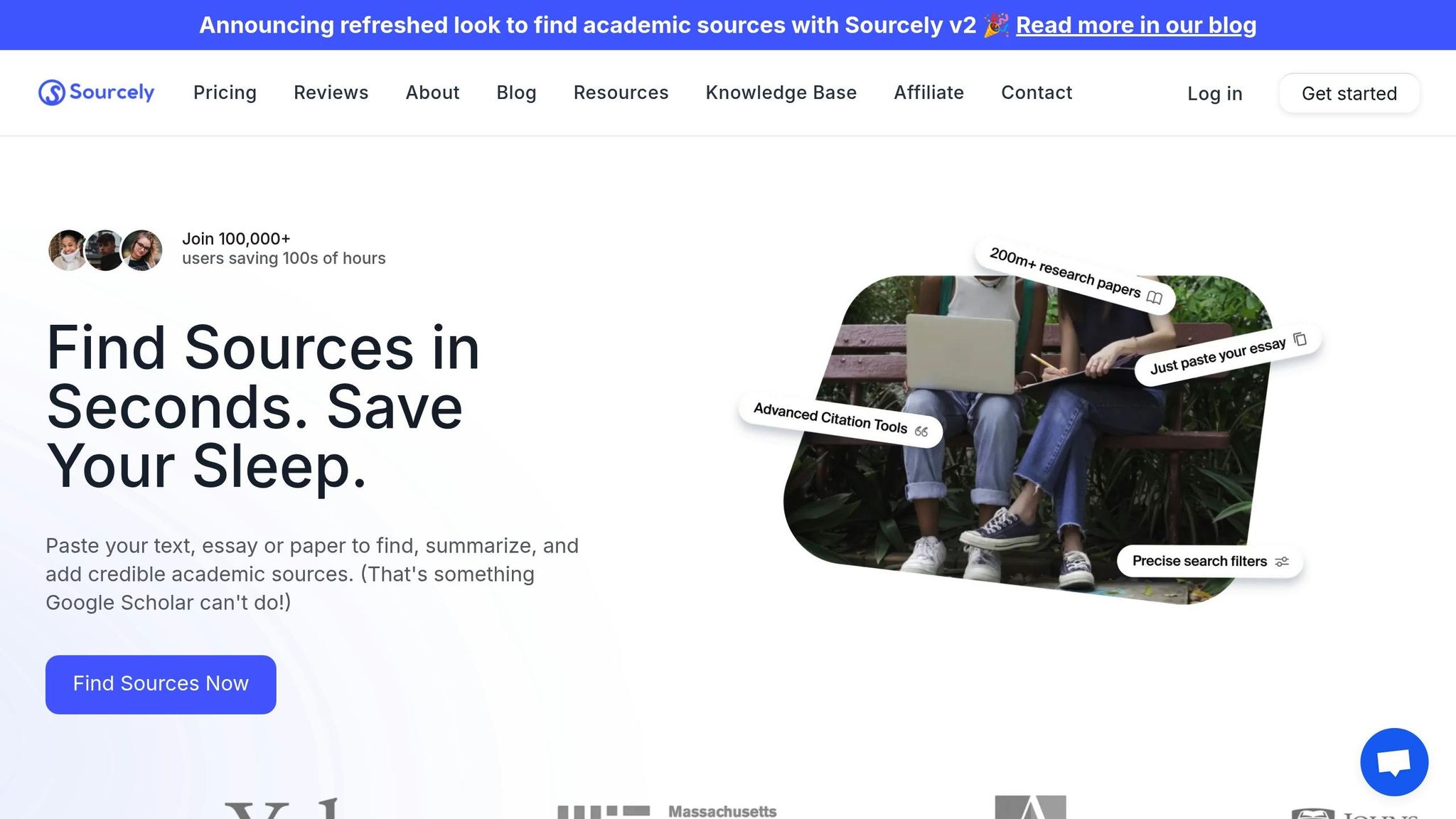
Find Academic Articles
Looking for academic articles but don't know where to start? Here's a quick guide to help you find trusted, peer-reviewed sources for your research. Academic articles are the gold standard for reliable information, thanks to their rigorous review process. Whether you're writing a paper or diving into a topic, knowing how to access and use these resources is key.
Key Takeaways:
- What are academic articles? Research-based papers written by experts and reviewed by peers to ensure accuracy.
- Why use them? They provide verified information to support your arguments and decisions.
- Types of sources: Scholarly journals, books, conference papers, government documents, and dissertations.
- Tools for finding articles: Platforms like Sourcely simplify the process with features like AI suggestions, citation exports, and free PDFs.
- Plans: Sourcely offers free and paid options, with features like unlimited uploads and advanced filters in its premium plans.
Tip: Start with free tools to explore, and upgrade if you need more robust features for larger projects.
What Academic Articles Are and How They Help
What Are Academic Articles?
Academic articles are research-driven papers written by experts in their fields and published in scholarly journals, conference proceedings, or as preprints. These papers undergo rigorous peer review - a process where other experts critically evaluate the work - to ensure accuracy and maintain high standards of quality. Academic articles are formal in tone, include the authors' credentials, and provide detailed reference lists to ensure transparency and accountability.
Why Use Trusted Academic Sources?
Relying on trusted academic sources strengthens the foundation of your research. Peer-reviewed evidence adds credibility to your arguments and ensures your work is grounded in reliable data.
"Using reliable and credible sources is essential for any literature review. It establishes a solid foundation for your research, ensuring that the information you present is accurate and trustworthy." - Enago Read
Scholarly sources go beyond opinion; they are built on systematic research and data, which elevates the quality of your work. As Eastern Michigan University explains:
"Because of the level of authority and credibility evident in scholarly sources they contribute to the overall quality of your papers. Use of scholarly sources is an expected attribute of academic course work." - Eastern Michigan University
The depth and rigor of these sources often reveal insights that may not be immediately apparent in less formal materials.
Types of Academic Sources
Different academic sources serve different purposes, and knowing when to use each type can help you construct stronger, more well-rounded arguments:
- Scholarly journals: These feature original research, case studies, and expert analyses. Most articles are peer-reviewed, ensuring they meet high standards of reliability.
- Books and book chapters: These provide extensive analysis and background on topics, often including historical context. While not always up-to-date, they remain valuable for comprehensive overviews.
- Conference proceedings: These include papers presented at academic conferences, often showcasing cutting-edge research and recent developments.
- Government documents: Reports, statistics, white papers, and official transcripts offer authoritative data and insights into policy-related issues.
- Theses and dissertations: These present in-depth research conducted by graduate students, often including detailed literature reviews and original contributions.
| If you need... | Try using... |
|---|---|
| Expert evidence | Scholarly articles, books, and statistical data |
| A general overview of a topic | Books or encyclopedias |
| Information about a very recent topic | Conference proceedings, websites, and recent journal articles |
| Official data and policy information | Government documents and reports |
| In-depth analysis of specific issues | Theses, dissertations, and scholarly books |
Selecting the right type of source depends on your research goals. For the most current findings, focus on recent journal articles and conference papers. If you need a broader understanding or historical context, scholarly books and government reports are excellent choices. With this knowledge, you'll be better equipped to use Sourcely's tools to simplify your research process.
Finding Credible Sources on Google Scholar | Trustworthy Sources for Students and Researchers

How to Start Using Sourcely

Sourcely simplifies academic research in the U.S. with an easy-to-navigate interface. Whether you're a graduate student polishing your thesis or an undergrad diving into your first research paper, Sourcely makes it straightforward to find credible sources for your work.
Creating Your Sourcely Account
Getting started with Sourcely is quick and hassle-free, giving you access to millions of academic papers in just a few steps. The sign-up process is designed to be simple while ensuring the platform tailors its recommendations to your specific research needs.
To begin, head over to the Sourcely website and click the "Sign Up" or "Get Started" button on the homepage. You can register using your email and a password or link your Google or Facebook account for convenience.
Once you've entered your details, you'll receive a verification link via email. Open the email and click the link to confirm your account. After verification, you'll be prompted to complete your profile by providing information about your academic background and research interests. This step helps Sourcely's AI deliver personalized suggestions, whether you're studying engineering, psychology, literature, or another field.
Before finishing, you'll need to agree to Sourcely's terms of service and privacy policy. Once you've reviewed these, click the "Create Account" or "Finish" button to finalize your setup. Your account will be ready to use immediately, unlocking all the tools you need to streamline your research.
Basic Features for New Users
Sourcely is built for efficiency, letting you focus on finding quality sources without getting bogged down by overly complex tools. Its standout feature is the ability to analyze your text and suggest relevant academic sources.
New users can paste their paper or essay directly into the platform, where Sourcely's AI scans the content to identify areas that need citations. This takes the guesswork out of traditional research, saving you time and effort.
For example, Sourcely Pro can analyze a 1,000-word paper in under 30 seconds. The platform highlights sections of your text that require citations and suggests reliable sources, showing exactly where to place each reference. This visual approach makes it easy to integrate sources seamlessly into your work.
Additionally, many sources are available as free PDFs, eliminating the frustration of paywalls. Sourcely also allows you to export references in various formats, making citation and bibliography creation a breeze.
Advanced filters let you refine your search results by publication year, author, relevance, and more, ensuring you find the most suitable sources for your project. New users can try out up to 300 characters for free, giving you the chance to explore Sourcely's capabilities before upgrading to a paid plan.
U.S. Format Settings
Sourcely is pre-configured to meet American academic standards, offering citation styles like APA, MLA, and IEEE, along with U.S. English spelling and MM/DD/YYYY date formatting. For instance:
- APA: Common in Education, Psychology, and Sciences.
- MLA: Used in the Humanities.
- Chicago/Turabian: Preferred for Business, History, and Fine Arts.
Sourcely's AI tools make managing these styles easy. You can select the format required for your assignment and even switch between styles without manually reformatting your references. This automated system reduces the risk of errors, which is critical given the strict formatting rules in American academic institutions.
In November 2024, Sourcely emphasized its AI-driven features, including seamless citation exports across multiple formats and smart recommendations for additional references based on your existing sources. The platform also integrates with major research databases, making it particularly helpful for large-scale projects often required in graduate programs.
Advanced Search Tools for Better Results
Once you're familiar with Sourcely's basic features, its advanced search tools can take your research to the next level. With access to a database of over 200 million papers, these tools are designed to help you zero in on the exact sources you need, saving time and effort.
Using Advanced Search Filters
Sourcely's advanced filters make it easy to narrow down broad searches into highly specific results. Instead of wading through irrelevant papers, you can apply multiple criteria at once. To get started, click the "Filters" button after entering your search terms. From there, you can refine your results by relevance, publication year, citation count, or even specific titles.
For instance, filtering by publication year is perfect when you need the latest research or want to explore a historical trend. If you're researching climate change policy, you might focus on recent papers for current insights or set a custom range to compare past and present approaches. Citation count filtering helps you identify influential studies, while relevance sorting uses Sourcely's AI to bring the most applicable sources to the top. You can also filter by author to find works from key researchers in your field. These tools make it easier to locate the right papers, access PDFs, and manage citations efficiently.
Getting Free PDFs and Exporting Citations
After narrowing your search, accessing full-texts and citations is straightforward. Sourcely offers free PDF access for many papers, ensuring you can quickly retrieve the content you need. Look for the "Download the article as a PDF" option in your search results. This feature ensures you can access open resources without unnecessary barriers.
Exporting citations is just as simple. Sourcely supports multiple reference formats and automates citation formatting with its AI tools. Before exporting, you can select your preferred citation style to maintain consistency in your bibliography. Regularly exporting and reviewing your citations is a smart way to avoid errors and keep your work organized.
Pasting Essays for Custom Suggestions
If you've already drafted your essay, Sourcely can help you enhance it by suggesting relevant sources. Just paste your draft into the platform, and its AI will analyze your text, identify gaps, and recommend precise references. This is especially handy for students who prefer to write first and add scholarly citations later. The tool tailors its suggestions to the context of your work, making it a flexible resource for a wide range of topics. With this feature, your draft becomes a blueprint for building a well-supported, research-backed essay.
sbb-itb-f7d34da
Using AI Tools to Speed Up Research
Once you've got the hang of basic search and filtering, Sourcely's AI tools take your research to the next level. They automate repetitive tasks and provide instant insights, making the research process faster and more efficient every step of the way.
AI Summaries for Quick Article Reviews
Sifting through dozens of academic papers can be a massive time sink. Sourcely's AI helps by scanning its vast database and creating concise summaries of each source. These summaries highlight the main points, making it easy to spot the most relevant papers without having to read every single one in full.
This feature is especially useful during the early stages of research, saving you valuable time by narrowing down which articles are worth diving into.
Adding Sources Directly to Your Papers
In addition to summaries, Sourcely simplifies the process of integrating sources into your writing. Just paste your text into the platform, and the AI will identify key sections and suggest relevant sources, complete with automated citation formatting.
The tool provides links to the original articles or PDFs for easy access. It supports multiple citation styles, including APA, MLA, and Chicago. Once you've chosen your sources, you can export your references in various formats, making it a breeze to compile your bibliography.
Automating Research Tasks with AI
Sourcely also handles time-consuming tasks like importing references directly from library databases and online catalogs, depending on your institution's setup. Plus, a handy browser extension lets you add references from web pages you come across during your research.
If you encounter sources that aren't available online, you can manually add them to your project, ensuring your bibliography remains complete. These automation features work seamlessly with the manual methods discussed earlier, creating a well-rounded toolkit for academic research.
Sourcely Plans: Free vs Paid Options
Sourcely offers a range of plans tailored to meet the needs of all types of researchers, from casual users to those tackling extensive academic projects. The pricing structure is designed to fit different budgets and research goals.
What You Get with the Free Plan
The free plan is a great way to get started with Sourcely. It lets you explore key features like finding credible sources and generating citations - all without spending a dime. However, it does come with a 300-character limit per upload. This means you can only paste short snippets of text when searching for source suggestions.
While the free plan has its limits, it still delivers reliable results within the 300-character boundary. Basic search functionality is available, making it a helpful tool for smaller research tasks. That said, for more in-depth research, you’ll need to consider one of the paid options, which unlock the platform’s full potential.
Paid Plan Benefits and Pricing
Sourcely’s paid plans open the door to unlimited uploads, AI-generated summaries, and an ad-free experience. The pricing options are designed to suit various usage levels and budgets.
- Try Once Plan: For $7, this plan provides 2,000 characters in Pro mode. It’s perfect for one-off projects or for testing premium features before committing to a subscription.
- Pro Membership: At $17 per month, this plan is ideal for regular users. It’s more economical than repeatedly purchasing the Try Once option.
- Annual Subscription: For those using Sourcely throughout the year, the annual plan costs $167. This option offers significant savings compared to paying monthly.
- Believer Plan: Priced at $347, this one-time payment covers three years of access. It’s a smart choice for students and researchers planning to rely on Sourcely over the long term.
Sourcely also provides discounts to make its plans even more affordable. For instance, Yomu premium users enjoy a 30% discount on all paid plans, and occasional promotional codes can further reduce costs.
Plan Comparison Chart
Here’s a quick breakdown of what each plan includes:
| Feature | Free Plan | Try Once | Pro Monthly | Pro Yearly | Believer |
|---|---|---|---|---|---|
| Price | $0 | $7 | $17/month | $167/year | $347 one-time |
| Character Limit | 300 characters | 2,000 characters | Unlimited | Unlimited | Unlimited |
| AI Summaries | No | Yes | Yes | Yes | Yes |
| Full Source Access | No | Yes | Yes | Yes | Yes |
| Ad-Free Experience | No | Yes | Yes | Yes | Yes |
| Citation Export | Limited | Full | Full | Full | Full |
| Duration | Ongoing | One-time use | Monthly billing | Annual billing | 3 years |
| Best For | Testing interface | Single project | Regular users | Frequent researchers | Long-term academics |
This comparison highlights that while the free plan is a good starting point, the paid plans are essential for anyone doing serious academic research. The Pro memberships offer flexibility for most users, while the Believer plan is the best choice for those who need a long-term solution.
Conclusion: Making Research Easier with Sourcely
Sourcely has redefined how academic research is done. With access to over 200 million research papers and AI-driven tools, the platform takes the hassle out of finding relevant sources. Instead of wading through endless search results, you can simply paste your text and let Sourcely pinpoint the materials you need.
What truly makes Sourcely stand out is its commitment to academic integrity. By exclusively sourcing content from peer-reviewed journals and academic conferences, it ensures that every result meets scholarly standards. This means you can skip the tedious task of verifying source credibility. Plus, features like advanced search filters, concise summaries, free PDF downloads, and easy citation exports make the research process even smoother.
Sourcely also offers flexible pricing options, catering to a range of research needs.
With over 100,000 users already on board, Sourcely has proven to save researchers countless hours. Its AI-powered tools, extensive database, and intuitive design address the most time-consuming parts of research - searching for and evaluating sources. Whether you're a student working on your first essay or a seasoned academic tackling a major project, Sourcely equips you with the tools to confidently find, assess, and cite the right sources.
FAQs
How does Sourcely ensure the academic articles it provides are trustworthy and peer-reviewed?
Sourcely ensures the dependability of its academic articles by exclusively using peer-reviewed journals and well-regarded scholarly publications. These sources are rigorously reviewed by field experts, guaranteeing both accuracy and trustworthiness.
With a commitment to providing only high-quality, verified content, Sourcely makes it easier for you to access reliable research for your studies or projects.
How can Sourcely's AI tools improve your academic research process?
Sourcely's AI tools aim to streamline the research process, helping you find reliable sources quickly and efficiently. They provide clear, accurate summaries and advanced search filters, making it simple to refine your results without hassle.
On top of that, you can export citations and references with ease, eliminating the headache of formatting. With recommendations tailored specifically to your research focus, Sourcely lets you concentrate on what really matters - producing top-notch work.
What extra features do I get with Sourcely's paid plans compared to the free version?
Sourcely's paid plans come with some standout perks: unlimited searches, access to advanced sources, and AI-powered factual summaries that make digging into research easier and quicker. On top of that, you get team collaboration tools, which simplify working on group projects and sharing discoveries.
These tools are built to help you work faster, ensure accurate results, and make the research process smoother for both professionals and students.